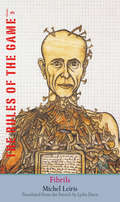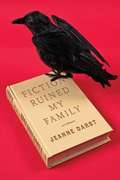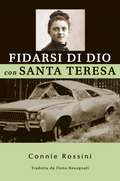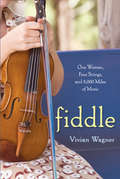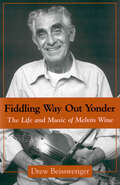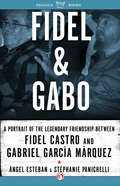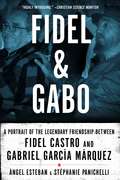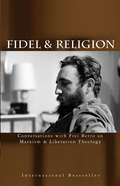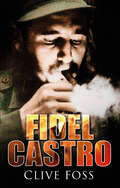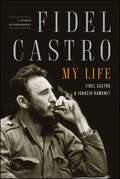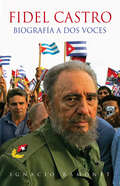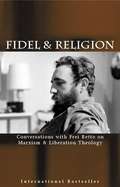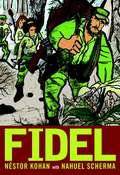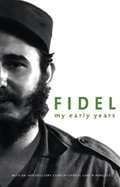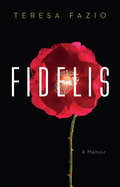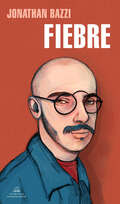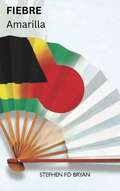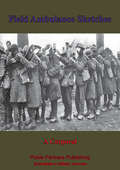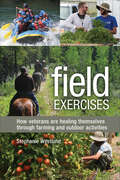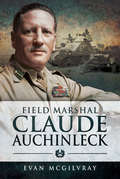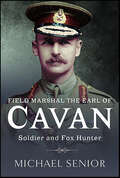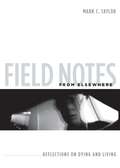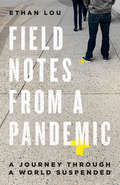- Table View
- List View
Fibrils: The Rules of the Game, Volume 3
by Lydia Davis Michel LeirisA major publishing event: the third volume of Michel Leiris's renowned autobiography, now available in English for the first time in a brilliant translation by Lydia Davis A beloved and versatile author and ethnographer, French intellectual Michel Leiris is often ranked in the company of Proust, Gide, Sartre, and Camus, yet his work remains largely unfamiliar to English-language readers. This brilliant translation of Fibrils, the third volume of his monumental autobiographical project The Rules of the Game, invites us to discover why L#65533;vi-Strauss proclaimed him "incontestably one of the greatest writers of the century. " Leiris's autobiographical essay, a thirty-five-year project, is a primary document of the examined life in the twentieth century. In Fibrils, Leiris reconciles literary commitment with social/political engagement. He recounts extensive travel and anthropological work, including a 1955 visit to Mao's China. He also details his suicidal "descent into Hell," when the guilt over an extramarital affair becomes unbearable. A ruthless self-examiner, Leiris seeks to invent a new way of remembering, probe the mechanisms of memory and explore the way a life can be told.
Fiction Ruined My Family
by Jeanne DarstAugusten Burroughs meets Mary Karr: a deeply funny and wickedly entertaining family memoir The youngest of four daughters in an old, celebrated St. Louis family of prominent journalists and politicians on one side, debutantes and equestrians on the other, Jeanne Darst grew up hearing stories of past grandeur. And the message she internalized as a young girl was clear: While things might be a bit tight for us right now, it’s only temporary. Soon her father would sell the Great American Novel and reclaim the family’s former glory. The Darsts uproot themselves and move from St. Louis to New York. Jeanne’s father writes one novel, and then another, which don’t find publishers. This, combined with her mother’s burgeoning alcoholism-nightly booze-fueled weepathons reminiscing about her fancy childhood-lead to financial disaster and divorce. And as Jeanne becomes an adult, she is horrified to discover that she is not only a drinker like her mother, but a writer like her father. At first, and for years, she embraces both activities-living in an apartment with no bathroom, stealing food from her babysitting gigs, and raising rent money by riding the subway topless and performing a one-woman show in her living room. Until gradually she realizes that this life has not been thrust on her in some handing-down-of-the-writing-mantle-way. She has chosen it; and until she can stop putting drinking and writing ahead of everything else, it’s a questionable choice. "For a long time I was worried about becoming my father,” she writes. "Then I was worried about becoming my mother. Now I was worried about becoming myself. ” Ultimately, Darst sets out to discover whether a person can have the writing without the ruin, whether it’s possible to be both sober and creative, ambitious and happy, a professional author and a parent. Filled with brilliantly flawed, idiosyncratic characters and punctuated by Darst’s irreverent eye for absurdity, Fiction Ruined My Family is a lovingly told, wickedly funny portrait of an unconventional life. .
Fidarsi Di Dio Con Santa Teresa
by Connie Rossini Elena RovagnatiLe tue paure, debolezze, dubbi e rabbia ti impediscono una intimità con Cristo? Lotti con la disperazione? Lascia che S. Teresa ti insegni la fiducia perfetta. Scopri come Teresa di Lisieux si fidava di Dio attraverso tragedie, scrupoli, oscurità spirituale e sofferenze fisiche. Connie Rossini accoppia episodi della vita della santa con i ricordi della sua ricerca nel fidarsi. Con la Sacra Scrittura, il Catechismo della Chiesa Cattolica e le conoscenze della psicologia, Rossini porta i lettori a cedere completamente la propria vita a Gesù. Pratico e accessibile, Fidarsi di Dio con S. Teresa comprende domande di riflessione che lo rendono perfetto per club di libri e gruppi di fede. Il sindacato degli Scrittori Cattolici ha concesso il proprio sigillo di approvazione.
Fiddle
by Vivian WagnerFiddling suddenly seemed vitally important, even necessary, for me to learn. Perhaps it had to do with grief for my mom's death, and with the fact that I was just starting to feel the inklings of a midlife crisis coming on. All I knew consciously, though, was that I had to learn it.After a chance encounter with fiddle music, Vivian Wagner discovered something she never knew she had lacked. The fiddle had reawakened not only her passion for music, but for life itself. From the remote workshop of a wizened master fiddle maker in the Blue Ridge Mountains to a klezmer band in Cleveland, from Cajun fiddle music in Katrina-ravaged New Orleans to a fiddle camp in Tennessee, Vivian's quest to master the instrument becomes a journey populated by teachers and artisans--and ultimately creates a community that fortifies her through an emotionally crushing loss. Intimate and enlightening, this is a story about the unique gifts of the fiddle, the redeeming power of music, the freedom of improvisation--and the importance of knowing that even though a song may reach its end, there's always a new tune to learn. . ."Charming, smart, lyrical and surprising. I recommend it to anyone--savage beast or not--who needs their soul soothed." --Suzanne Finnamore, international bestselling author of Split
Fiddling Way Out Yonder: The Life and Music of Melvin Wine (American Made Music Series)
by Drew BeisswengerFrom a small mountain town in West Virginia, elder fiddler Melvin Wine has inspired musicians and music enthusiasts far beyond his homeplace. Music, community, and tradition influence all aspects of life in this rural region. Fiddling Way Out Yonder: The Life and Music of Melvin Wine shows how in Wine's playing and teaching all three have created a vital and enduring legacy. Wine has been honored nationally for his musical skills and his leadership role in an American musical tradition. A farmer, a coal miner, a father of ten children, and a deeply religious man, he has played music from the hard lessons of his own experience and shaped a musical tradition even while passing it to others. Fiddling Way Out Yonder examines the fiddler, his music, and its context from a variety of perspectives. Many rousing fiddlers came from isolated mountain regions like Melvin's home stomp. The book makes a point to address the broad historical issues related both to North American fiddling and to Wine's personal history. Wine has spent almost all of his ninety-two years in rural Braxton County, an area where the fiddle and dance traditions that were strong during his childhood and early adult life continue to be active today. Utilizing models from folklore studies and ethnomusicology, Fiddling Way Out Yonder discusses how community life and educational environment have affected Melvin's music and his approaches to performance. Such a unique fiddler deserves close stylistic scrutiny. The book reveals Wine's particular tunings, his ways of holding the instrument, his licks, his bowing techniques and patterns, his tune categories, and his favorite keys. The book includes transcriptions and analyses of ten of Melvin's tunes, some of which are linked to minstrelsy, ballad singing traditions, and gospel music. Narratives discuss the background of each tune and how it has fit into Melvin's life. While his music is tied to community and family traditions, Melvin is a unique and complex person. This biography heralds a musician who wants both to communicate the spirit of his mountains and to sway an audience into having an old-fashioned good time.
Fidel & Gabo
by Ángel Esteban Stéphanie PanichelliThe story of the controversial friendship between Nobel prize-winning author Gabriel Gabriel García Márquez and Fidel Castro In Fidel and Gabo, Márquez scholars Ángel Esteban and Stéphanie Panichelli examine this strange, intimate, and incredibly controversial friendship between the beloved author and Cuban dictator, exposing facets of their personalities never before revealed to the greater public. For years, Márquez, long fascinated with power, solicited and flattered Castro in hopes of a personal audience, for he viewed Castro's Cuba as the model on which Latin American would one day build its own brand of socialism. Fidel and Gabo is a vivid and in-depth look at two of the most influential men of the modern era, their worlds, and the effect this friendship has had on their life and works.
Fidel & Gabo: A Portrait of the Legendary Friendship Between Fidel Castro and Gabriel Garcia Marquez
by Angel Esteban Stephanie Panichelli<P> An exposé of the controversial friendship between Nobel-prize winning author Gabriel Garcia Marquez and Fidel Castro. <P> Few contemporary writers are more revered by Americans than Gabriel Garcia Marquez, the Nobel prize-winning author of Love in the Time of Cholera and One Hundred Years of Solitude. And few political leaders are more reviled than Fidel Castro. Yet these two seemingly disparate men are close friends. What could possibly unite these two men in friendship? <P> In Fidel and Gabo, Márquez scholars Ángel Esteban and Stéphanie Panichelli examine this strange, intimate, and incredibly controversial friendship between the beloved author and Cuban dictator, exposing facets of their personalities never before revealed to the greater public. For years, Márquez, long fascinated with power, solicited and flattered Castro in hopes of a personal audience, for he viewed Castro’s Cuba as the model on which Latin American would one day build its own brand of socialism. Upon their first meeting, Castro quickly came to regard Márquez as a genius and still calls him his closest friend and confidant. To this day, Márquez still gives Castro “first look” at all his manuscripts and craves his approval. <P> Fidel and Gabo is a vivid and in-depth look at two of the most influential men of the modern era, their worlds, and the effect this friendship has had on their life and works.
Fidel & Religion: Conversations with Frei Betto on Marxism & Liberation Theology
by Fidel Castro Frei Betto Armando HartA bestseller that offers an intimate insight into Fidel Castro, the man behind the beard! · This historic encounter between religion and revolution paved the way for Pope John Paul II's historic visit to Cuba in 1999 and the rule change in the Cuban Communist Party (1992) accepting as members those practicing their religious faith ·
Fidel Castro
by Clive FossFidel Castro is a dynamic and charismatic leader, who has led Cuba through success and failures since 1959. Son of a rich landowner, he became a radical revolutionary who attempted to overthrow the government in 1956 with a tiny band of followers. Using propaganda and subversion as much as sudden attacks from his mountain hideout, he gained victory in 1959. He liberated his country from one dictator and the overwhelming influence of the United States, only to turn it into another dictatorship firmly under the control and patronage of the Soviet Union. The failure of the American attack at the Bay of Pigs in 1961 added to his reputation, while the missile crisis of 1962 put Cuba right at the centre of the Cold War. Later, by sending his army to Africa and supporting guerrilla movements in Latin America, he made Cuba a signficant player on the world stage. Despite many attempts to remove him and the economic collapse of the USSR, Castro survived and in 1999, celebrated 40 years of his regime.
Fidel Castro: A Spoken Autobiography
by Fidel Castro Ignacio Ramonet Andrew HurleyFidel Castro is perhaps the most charismatic and controversial head of state in modern times. A dictatorial pariah to some, he has become a hero and inspiration for many of the world's poor, defiantly charting an independent and revolutionary path for Cuba over nearly half a century. Numerous attempts have been made to get Castro to tell his own story. But only now, in the twilight of his years, has he been prepared to set out the details of his remarkable biography for the world to read. This book is nothing less than his living testament. As he told reporters, his desire to finish checking its text was the one thing that kept him going through his recent illness. He presented a copy of the book in its Spanish edition to his compadre President Hugo Chávez of Venezuela. In these pages, Castro narrates a compelling chronicle that spans the harshness of his elementary school teachers; the early failures of the revolution; his intense comradeship with Che Guevara and their astonishing, against-all-odds victory over the dictator Batista; the Cuban perspective on the Bay of Pigs and the ensuing missile crisis; the active role of Cuba in African independence movements (especially its large military involvement in fighting apartheid South Africa in Angola); his relations with prominent public figures such as Boris Yeltsin, Pope John Paul II, and Saddam Hussein; and his dealings with no less than ten successive American presidents, from Eisenhower to George W. Bush. Castro talks proudly of increasing life expectancy in Cuba (now longer than in the United States); of the half million students in Cuban universities; and of the training of seventy thousand Cuban doctors nearly half of whom work abroad, assisting the poor in Africa, Asia, and Latin America. He is confronted with a number of thorny issues, including democracy and human rights, discrimination toward homosexuals, and the continuing presence of the death penalty on Cuban statute books. Along the way he shares intimacies about more personal matters: the benevolent strictness of his father, his successful attempt to give up cigars, his love of Ernest Hemingway's novels, and his calculation that by not shaving he saves up to ten working days each year. Drawing on more than one hundred hours of interviews with Ignacio Ramonet, a knowledgeable and trusted interlocutor, this spoken autobiography will stand as the definitive record of an extraordinary life lived in turbulent times.
Fidel Castro: A Spoken Autobiography
by Fidel Castro Ignacio RamonetFidel Castro is perhaps the most charismatic and controversial head of state in modern times. A dictatorial pariah to some, he has become a hero and inspiration for many of the world's poor, defiantly charting an independent and revolutionary path for Cuba over nearly half a century. Numerous attempts have been made to get Castro to tell his own story. But only now, in the twilight of his years, has he been prepared to set out the details of his remarkable biography for the world to read. This book is nothing less than his living testament. As he told reporters, his desire to finish checking its text was the one thing that kept him going through his recent illness. He presented a copy of the book in its Spanish edition to his compadre President Hugo Chávez of Venezuela. In these pages, Castro narrates a compelling chronicle that spans the harshness of his elementary school teachers; the early failures of the revolution; his intense comradeship with Che Guevara and their astonishing, against-all-odds victory over the dictator Batista; the Cuban perspective on the Bay of Pigs and the ensuing missile crisis; the active role of Cuba in African independence movements (especially its large military involvement in fighting apartheid South Africa in Angola); his relations with prominent public figures such as Boris Yeltsin, Pope John Paul II, and Saddam Hussein; and his dealings with no less than ten successive American presidents, from Eisenhower to George W. Bush. Castro talks proudly of increasing life expectancy in Cuba (now longer than in the United States); of the half million students in Cuban universities; and of the training of seventy thousand Cuban doctors nearly half of whom work abroad, assisting the poor in Africa, Asia, and Latin America. He is confronted with a number of thorny issues, including democracy and human rights, discrimination toward homosexuals, and the continuing presence of the death penalty on Cuban statute books. Along the way he shares intimacies about more personal matters: the benevolent strictness of his father, his successful attempt to give up cigars, his love of Ernest Hemingway's novels, and his calculation that by not shaving he saves up to ten working days each year. Drawing on more than one hundred hours of interviews with Ignacio Ramonet, a knowledgeable and trusted interlocutor, this spoken autobiography will stand as the definitive record of an extraordinary life lived in turbulent times.
Fidel Castro: Biografía a dos voces
by Ignacio RamonetTestimonio excepcional y análisis histórico, este libro es una auténtica «biografía a dos voces»: la memoria oral del comandante, el polémico Fidel Castro, el último «monstruo sagrado» de la política internacional. Tras la larga convalecencia sufrida en 2006, Fidel Castro revisó y amplió el exhaustivo trabajo de investigación y entrevistas que Ignacio Ramonet había publicado ese mismo año. Sin duda, el presente libro responde a preguntas imprescindibles para entender la historia reciente de Cuba y completa de forma definitiva aquella obra. ¿Cómo eran los padres de Castro? ¿Dónde y cuándo se forjó el rebelde? ¿Cómo fue su relación con el Che? ¿Estuvo el mundo al borde de una guerra nuclear durante la llamada «Crisis de los misiles»? ¿Qué impresión le causó el papa Juan Pablo II cuando visitó la isla en 1998? ¿Qué piensa de la globalización neoliberal y de George W. Bush? ¿Del rey Juan Carlos y los presidentes españoles? ¿De Hugo Chávez y Evo Morales? ¿Existe corrupción en el régimen? ¿Qué ocurrirá con Cuba en el futuro próximo? Fidel Castro. Biografía a dos voces traza un recorrido por la controvertida figura del líder cubano, proporcionando un relato apasionante sobre el pasado, el presente y el porvenir de la Revolución, y se constituye como la memoria oral de uno de los hombres que definieron el siglo XX. Reseña:«En bien pocas ocasiones la inteligencia de la especie humana aparece condensada en un libro dibujando la senda por donde esa especie podría transitar.»Belén Gopegui
Fidel and Religion: Fidel Castro in Conversation with Frei Betto on Marxism and Liberation Theology
by Fidel Castro Frei BettoIn an intimate 23-hour dialogue with Brazilian liberation theologist Frei Betto, Fidel Castro revealed much about his personal background and candidly discussed his views on religion.
Fidel: An Illustrated Biography of Fidel Castro
by Nahuel Scherma Nestor Kohan Elise Buchman Miracle JonesIn the United States, ninety miles from Cuban shores, tempers flare on the subject of Fidel Castro: some say he is a liberator, some say a dictator. In Fidel, Nestor Kohan and Nahuel Scherma present one of the towering figures of the twentieth-century as he is seen by Latin Americans: as the leader who, for over fifty years, has stood up to the greatest military power in the world, and remained standing.Here, in Kohan's incisive prose and Scherma's passionate illustrations, is the man who, inspired by decades of Latin American Marxist thinking, fought from the mountains of the Sierra Maestra to free his country--the man who walked the razor's edge between military threats by the United States and political coercion by the Soviet Union--the man who became a leader in the revolution against colonial governments from Angola to Vietnam to Latin America--the man who fought, above all, to transform the conscience of his people, spreading literacy, culture, and free medical care to everyone on the island. Here is Fidel--the man who became the symbol of the revolution in the New World.
Fidel: My Early Years
by Fidel CastroExcerpting conversations between Cuban President Fidel Castro and Brazilian priest Frei Bretto, this work contains Castro's own account of his childhood and youth. It also contains a 1995 speech by Castro at the U. of Havana in which he reflects on his days as student organizer and Colombian journalist Arturo Alape about the April 1948 popular uprising in Colombia, which Castro witnessed. New to this edition are excerpts from Castro's prison letters shortly after the failed attack on the Moncada barricades in 1953.
Fidelis: A Memoir
by Teresa FazioIn 1998 Teresa Fazio signed up for the Marine Corps&’ ROTC program to pay her way through MIT. After the United States was attacked on September 11, 2001, leading to the War on Terror, she graduated with a physics degree into a very different world, owing the Marines four years of active duty. At twenty-three years old and five foot one, Fazio was the youngest and smallest officer in her battalion; the combined effect of her short hair, glasses, and baggy camo was less Hurt Locker than Harry Potter Goes to War. She cut an incongruous figure commanding more experienced troops in an active war zone, where vulnerability was not only taboo but potentially lethal. In this coming-of-age story set in the early days of Operation Iraqi Freedom, Fazio struggles with her past, her sense of authority, and her womanhood. Anger stifles her fear and uncertainty. A forbidden affair placates her need for love and security. But emptiness, guilt, and nightmares plague Fazio through her deployment—and follow her back home.
Fiebre
by Jonathan Bazzi«Tengo el VIH y para protegerme os lo contaré todo.» El sorprendente debut finalista del Premio Strega que ha roto moldes en Italia. Jonathan tiene treinta y un años cuando empieza a sufrir una extraña febrícula que parece haberse instalado de forma permanentemente en su cuerpo. Ningún médico es capaz de encontrar la causa, hasta que algunas semanas después llega el fatídico diagnóstico: VIH. En esta nueva etapa de su vida Jonathan se enfrenta a la vertiginosa idea de su muerte, redefiniendo su posición frente al mundo y la idea que tiene de sí mismo. Pero no es fácil cuando tu infancia y adolescencia han tenido lugar en el seno de una familia desestructurada de un barrio lumpen del extrarradio de Milán. Jonathan era un niño tímido, pacífico y tartamudo; imaginaba ser Wonder Woman mientras descubría su atracción por los chicos. Desde entonces, ha tenido que remar a contracorriente para encontrar su verdadera identidad. Ahora el virus también forma parte de ella, pero a pesar de los prejuicios, el rechazo y el miedo, no está dispuesto a esconderse y dar pasos atrás. Fiebre es una emotiva y poderosa crónica de la aceptación moral y psicológica de un estigma que nos concierne a todos, pero también un relato de redención y superación que ha sido finalista del Premio Strega. Una historia excepcional y sorprendente, sincera y brutal, sobre un chico con una cualidad imborrable que no teme exhibirla para normalizarla ante al mundo. La crítica ha dicho...«Un libro estimulante, del que uno sale mejor persona o con ganas de intentarlo.»Gonzalo Torné «No fue solo leer. Fue aprender a amar a alguien. Ese alguien es Jonathan Bazzi que, con Fiebre, debuta en las librerías, detonando de tal manera que lastima los ojos y el corazón.»Elena Giorgi, La lettrice geniale «Desnudarse completamente y ganar el Strega milanés.»La Reppublica «Una autobiografía sincera, brutal, irónica y profunda. Un debut literario que nace de la necesidad de compartir y alentar a "superar la cultura del secreto, del silencio, de la vergüenza". [...] El miedo de Jonathan deviene coraje y, en este libro, una sesión psicoanalítica, un flujo de conciencia.»Mariateresa Totaro, Il fatto quotidiano «Una epopeya que gira en torno al descubrimiento de la seropositividad en la retaguardia milanesa [...] Escrito en primera persona con una sinceridad desapasionada y lograda, y con una pasión seductora por contar historias.»Corriere della Sera «En Fiebre la autoficción va un paso más allá. Y es mérito de su encantadora honestidad, que no retrocede ante las emociones, ni siquiera ante los prejuicios más incómodos.»Mediaset TGCOM 24 «Jonathan es el autor que, a sus treinta y pocos años, se ha hecho a sí mismo con este valiente y poderoso debut. Pero Jonathan es también el personaje. Se ha metamorfoseado, escribiendo, en el héroe de una historia de redención y venganza, de una aventura de exploración y conocimiento, de un cuento de hadas verosímil, si se desea, un cuento de hadas dedicado "a los niños invisibles" que, demasiado inteligentes para ser engañados acerca de un final feliz, se les advierte lo suficiente como para captar el hechizo donde lo hay.»Corriere della Sera «Una vida de verdad narrada como una novela [...] un libro objetivamente impecable, prácticamente imposible de criticar.»Clara Mazzoleni, Rivista Studio
Fiebre amarilla
by Stefhen BryanLuchando contra la depresión, la adicción y las dificultades de aprendizaje de sus años de formación, Bryan forjó la vida que deseaba a base de pura persistencia, licenciándose en UCLA a los 30 años y siguiendo sus pulsiones hasta Japón poco después. En abril de 2001, el futuro autor liquidó sus bienes en California y empacó para trasladarse a Japón. Desde entonces, las experiencias y la perspectiva de Stefhen Bryan sobre Japón no han dejado de formarse y transformarse. Defensor a ultranza del país, Bryan nunca se ha abstenido de llamar la atención al gobierno japonés, y a la sociedad en general, sobre temas controvertidos como la división de sexos, las excesivas horas de trabajo y, especialmente, las inhibiciones y peculiaridades sexuales que definen las relaciones de la nación. Atribuyendo al país y a su sexo débil la curación de su adicción sexual de toda la vida, la perspectiva occidental del escritor sobre el país al que llama hogar se vertió ─quizá se desangró─ en las páginas de su explícito estudio etnográfico. Bryan ofrece una perspectiva única de una sociedad homogénea y conflictiva desde el trasfondo de un viajero occidental experimentado. Allí donde habla, el público se emociona y se asombra al mismo tiempo al escuchar su visión específica de Japón. A pesar de lo mucho que disfruta presentando estas ideas, nada podría gustarle más que volver a su patria adoptiva en la segunda mitad de 2011.
Field Ambulance Sketches
by Anon.The Anonymous N.C.O. "A Corporal" recounts his experiences as a stretcher bearer in the mud of Flanders Fields in 1917.The trenches for him and many of his comrades have changed them and here "...Life here is furtive and crouching; a "downward-looking" life; life under a lid. Here men acquire a strange mole-like character: quick to scent the danger that they cannot see; prompt to divine a line of escape where none seems possible. The clay that ingrains their skins seems to have inoculated them with some of the wisdom of Earth and her creeping things. They are subtle as weasels, sensitive as the naked worm..." As he and his fellow stretcher bearers go and collect the men injured and wounded at the front, they face the dangers of snipers, shelling, trench collapses, all the while carrying a heavy human bearing. Not as sanguine as some writers about facing the dangers for King and Country, our author does his duty with aplomb, great courage and a pinch of cynical black humour.
Field Exercises: How Veterans Are Healing Themselves through Farming and Outdoor Activities
by Stephanie WestlundHow connecting with nature is helping veterans reintegrate into civilian life and recover from PTSD.There are nearly twenty-five million veterans and active-duty soldiers in North America. Some experts estimate that more than one quarter of these men and women suffer from post-traumatic distress, and many other military persons experience difficulty reintegrating into civilian life. While conventionally prescribed treatments primarily involve medication and therapy, many people are discovering additional ways to manage their injuries and reduce their suffering.Field Exercises: How Veterans Are Healing Themselves through Farming and Outdoor Activities shares the compelling stories of men and women who are finding relief from stressful and traumatic military experiences, while also establishing community networks and other peer support initiatives. Stephanie Westlund examines:The deep and far-reaching connections between nature and human healthThe tremendous impact of stress and trauma on survivors' livesResources and groups providing opportunities in the emerging field of “Green Care”.Field Exercises offers hope for veterans searching for methods to ease the transition to civilian life and recover from military stress and trauma. This book will appeal to millions of North American soldiers, veterans, and their loved ones, doctors, psychiatrists, social workers and other caregivers, other groups struggling with high rates of stress and post-traumatic experience, and all those interested in the relationship between nature and human health.Stephanie Westlund holds a PhD in peace and conflict studies. She has been conducting research with veterans since 2009, and continues to be inspired by their courage and personal resolve to move through pain toward recovery, and their unrelenting desire to serve their communities.
Field Marshal Claude Auchinleck
by Evan McGilvrayThis military biography explores the life and service of a British Indian Army officer who served with distinction across both world wars.During the First World War, Field Marshal Claude Auchinleck was awarded a Distinguished Service Order for his efforts in Egypt and the Mesopotamian Campaign. Afterward, he aided the pacification of the Northwest Frontier, now Pakistan. In the Second World War he briefly led a division in the ill-fated Norway campaign before being appointed Commander-in-Chief, India. Auchinleck is best remembered for his time as Commander-in-Chief of the Middle East Theatre, where he halted Rommel at the First Battle of El Alamein. He then resumed command in India, where his leadership was vital to success in Burma. In the post-war years, he planned and oversaw the Partition of India and the British withdrawal.In this extensively researched biography, historian Evan McGilvray examines Auchinleck’s long career as well as the transformations of the British military and the Empire itself.
Field Marshal the Earl of Cavan: Soldier and Fox Hunter
by Michael SeniorField Marshal Lord Cavan (1865-1946) was one of the most distinguished commanders of the modern British army, but he divided opinion among his contemporaries. Some senior soldiers were disdainful. Field Marshal Sir Henry Wilson described him as ‘ignorant, pompous and vain’ and Brigadier General Sir James Edward Edmonds commented that Cavan ‘was bone from the neck upwards’. Yet many of Cavan’s subordinates praised him, saying ‘I had never seen Lord Cavan before and I was filled with admiration by the calm and quiet self-confidence of his manner’ and ‘Our new General, Lord Cavan, is simply A1 and the whole show runs like a well-oiled machine.’ So what were the real qualities and achievements of this remarkable but hitherto neglected officer who in a long career served in the Boer War and the First World War and then presided over the post-war reduction of the British army? Michael Senior, in the first full biography of Cavan, assesses him as a leader, a corps commander and an administrator, and places him among the front rank of the soldiers of his generation. He also explores Cavan’s personal life, his personality and how his aristocratic background, his wealth and his love of fox hunting affected his conduct in both war and peace.
Field Notes from Elsewhere: Reflections on Dying and Living
by Mark C. TaylorIn the fall of 2005, Mark C. Taylor, the controversial public intellectual and widely respected scholar, suddenly fell critically ill. For two days a team of forty doctors, many of whom thought he would not live, fought to save him. Taylor would eventually recover, but only to face a new threat: surgery for cancer. "These experiences have changed me in ways I am still struggling to understand," Taylor writes in this absorbing memoir. "After the past year, I am persuaded that I have done enough fieldwork to write a book that combines philosophical and theological reflection with autobiographical narrative. Writing is not only possible but actually seems necessary." Field Notes from Elsewhere is Taylor's unforgettable, inverted journey from death to life. Each of his memoir's fifty-two chapters and accompanying photographs recounts a morning-to-evening experience with sickness and convalescence, mingling humor and hope with a deep exploration of human frailty and, conversely, resilience. When we confront the end of life, Taylor explains, the axis of the lived world shifts, and everything must be reevaluated. As Taylor sorts through his remembrances, much that once seemed familiar becomes strange, paradoxical, and contradictory. He reads his experience with and against ghosts from his past, recasting the meaning of mortality, sacrifice, solitude, and abandonment, along with a host of other issues, in light of modern ways of dying. "You never come back from elsewhere," Taylor concludes, "because elsewhere always comes back with you."
Field Notes from Elsewhere: Reflections on Dying and Living
by Mark C. TaylorIn the fall of 2005, Mark C. Taylor, the controversial public intellectual and widely respected scholar, suddenly fell critically ill. For two days a team of forty doctors, many of whom thought he would not live, fought to save him. Taylor would eventually recover, but only to face a new threat: surgery for cancer. "These experiences have changed me in ways I am still struggling to understand," Taylor writes in this absorbing memoir. "After the past year, I am persuaded that I have done enough fieldwork to write a book that combines philosophical and theological reflection with autobiographical narrative. Writing is not only possible but actually seems necessary."Field Notes from Elsewhere is Taylor's unforgettable, inverted journey from death to life. Each of his memoir's fifty-two chapters and accompanying photographs recounts a morning-to-evening experience with sickness and convalescence, mingling humor and hope with a deep exploration of human frailty and, conversely, resilience. When we confront the end of life, Taylor explains, the axis of the lived world shifts, and everything must be reevaluated. As Taylor sorts through his remembrances, much that once seemed familiar becomes strange, paradoxical, and contradictory. He reads his experience with and against ghosts from his past, recasting the meaning of mortality, sacrifice, solitude, and abandonment, along with a host of other issues, in light of modern ways of dying. "You never come back from elsewhere," Taylor concludes, "because elsewhere always comes back with you."
Field Notes from a Pandemic: A Journey Through a World Suspended
by Ethan LouEqual parts travelogue and pandemic guide, journalist Ethan Lou examines the societal effects of COVID-19 and takes us on a mesmerizing journey around a world that will never be the same.Visiting Beijing in January to see his dying grandfather, Canadian journalist Ethan Lou unknowingly walks into a state under siege. In his journey out of China and into other hot zones in Asia and Europe, he finds himself witnessing the very earliest stages of a virus that will forever change the world as we know it. Lou argues that Coronavirus will have a far greater impact than SARS, for example, simply because China is now many more times integrated with the increasingly interconnected world. Over decades, globalization has crafted a world painfully sensitive and susceptible to shocks such as this pandemic. A crisis like it has thus been long overdue--and we have yet to see it unfold fully. In our integrated world, events that may previously be isolated now ripple farther and wider and in ways we do not expect and cannot foresee. We have not seen the worst, and if and when we outlast this pandemic, nothing will ever be the same--not just healthcare systems but also economies, politics and culture. Decisions now--or indecisions--will shape and define the world for decades.These ideas are fleshed out through the virus's spawning and how it spread, the unprecedented measures to contain it and an examination of past pandemics and other crises and how they shaped the world--and an argument for why this one's different. Lou shows how drastically the virus has transformed the world and charts the greater and more radical shifts to come. His ideas and arguments are framed around his journey around the world, whose path the virus seemed to follow until he landed safely in quarantine in a small town in Germany where he was able to take stock and start telling his story.
